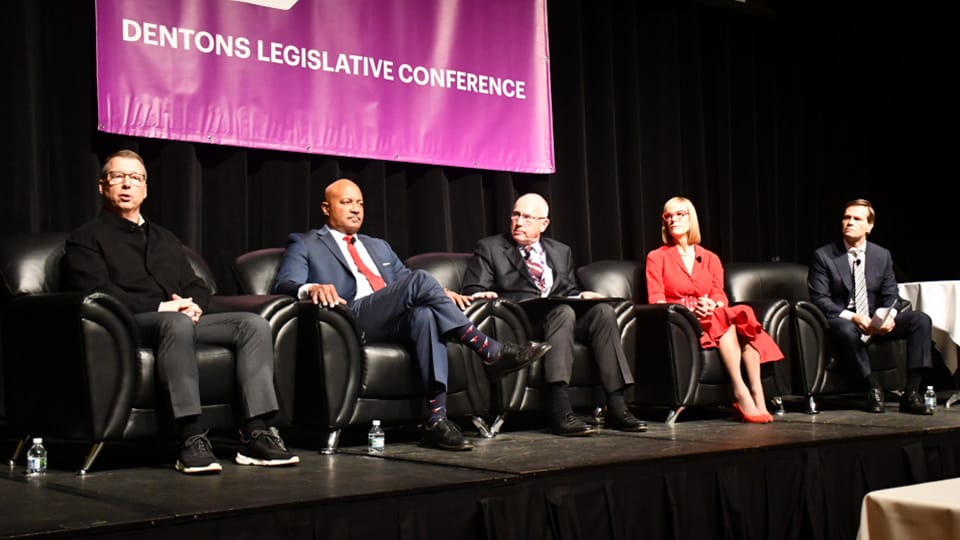Republican gubernatorial candidates wary of ‘axing’ state income tax
Subscriber Benefit
As a subscriber you can listen to articles at work, in the car, or while you work out. Subscribe Now
The five leading Republican candidates for governor of Indiana participated in a wide-ranging panel discussion Wednesday, finding agreement on topics such as public safety and education, but offering differing approaches to economic development and tax policy.
The 90-minute event took place at the 32nd annual Dentons Legislative Conference, an event that brings together some of Indiana’s biggest power players for policy discussions on economic, legal and social issues—just weeks before the Indiana General Assembly convenes.
Among the topics discussed at the Indiana Convention Center was a polarizing proposal to eliminate the personal income tax, a popular idea in some conservative circles that gained traction after Sen. Travis Holdman, an influential Republican lawmaker from northeast Indiana who chairs the Senate Appropriations Committee, floated the idea at last year’s conference.
That led to legislation to establish a task force to review the state’s taxation system and put together a report with recommendations after the 2024 session.
Lt. Gov. Suzanne Crouch, who is running to succeed a two-term limited Gov. Eric Holcomb, has turned the issue into one of her top policy proposals, but the four other candidates took a more cautious approach, instead advocating for a closer examination of state agencies and a gradual reduction of some taxes rather than nixing an $8 billion annual revenue stream.
“When it comes to that proposal, I think it was probably done without any thoroughly thinking through,” said U.S. Sen. Mike Braun, who was in Washington, D.C. and submitted pre-recorded comments via video. “It’s one-third of our state revenue. The annual budget is $22 billion, so obviously you could not ‘axe the tax.’”
Brad Chambers, the former commerce secretary who was a late entry in the crowded field of candidates, said the state should “take the proceeds of a growing economy” and invest it in education, health care and public safety. He also pointed to Indiana’s No. 9 overall ranking for business tax climate by the Tax Foundation, a Washington, D.C.-based think tank.
Eric Doden, a wealthy businessman from Fort Wayne who entered the race in 2021, called the idea “a gimmick,” while former Indiana Attorney General Curtis Hill advocated for reducing the corporate income tax rate.
Crouch has said the loss of revenue could be offset by examining inefficiencies in state government, but a look at other states that have eliminated their income tax shows that it was replaced by another revenue stream.
In Alaska, a state that repealed its income tax in 1980, a severance tax on the oil and natural gas industry keeps the government solvent, while Texas has higher-than-average property tax rates, and Florida brings in billions of dollars a year in tourism development taxes. Tennessee has the same state sales tax rate as Indiana at 7%, but local jurisdictions can enact their own sales tax, making the rate as high as 10% in some places.
Indiana received almost $8.2 billion in revenue from individual income taxes in 2022, accounting for more than 35% of the state’s overall tax revenue, according to the Indiana Legislative Services Agency. The only higher tax-revenue generator is the 7% sales tax, which brought in $10.3 billion, or more than 44% of overall tax revenue.
In 2022, lawmakers passed a tax-cut package that gradually reduced the income tax rate over the next seven years, from 3.23% to 2.9%, with the stipulation that state tax revenue must have grown at least 2% in the previous budget year. It was the state’s first income tax cut since 2013, and it was Holdman who added language to the bill to tie any income tax decrease to overall revenue growth.
